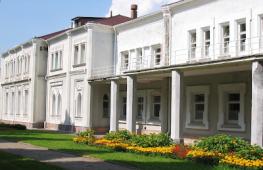Presentation in Russian on the topic of the sacrament. Presentation for a lesson on the sacrament
Communion The term "communion" is usually associated with Latin word participium participation, communion. These are words that are “involved” (related) to both the verb and the adjective. Participle independent part speech, which designates the action as a sign of the subject and answers the questions what? which? which? For example: If the night were long and dark ... I would have had time to reunite this virgin, immense silence and the world bubbling somewhere, invented by the man himself, built and squeezed it into the city cracks (V. Astafiev).

Real participles denote a sign of a person or object that is associated with the action of the same person or object: a running person (a person who runs); falling drop (drop that falls). Passive participles denote a sign, person or object that is associated with the action of another person or object: read books; books that someone has read); built house (a house that someone has built). Distinguish between active and passive participles

Verbal signs of participles Participles can be perfect and imperfective. They retain the form of the verb from which they are formed: to clean (non-native view) - cleaning, cleaning, cleaning; clean out (owl view) - cleaned out, cleaned out. Participles can be perfect and imperfect. They retain the form of the verb from which they are formed: to clean (non-native view) - cleaning, cleaning, cleaning; clean out (owl view) - cleaned out, cleaned out. Participles have present and past tenses: loving (present temp.) loved (past temp.), completed (present temp.) completed (past temp.), watered (present temp.) watered (past temp. ). Participles do not have future tenses. Participles have present and past tenses: loving (present temp.) loved (past temp.), completed (present temp.) completed (past temp.), watered (present temp.) watered (past temp. ). Participles do not have future tenses. Participles can be transitive: leafing through (what?) a book leafing through (what?) a book; picking (what?) flowers picking (what?) flowers and intransitive: to be sad sad; run fled. Participles can be transitive: leafing through (what?) a book leafing through (what?) a book; picking (what?) flowers picking (what?) flowers and intransitive: to be sad sad; run fled. Communions are irrevocable and recurrent: washing, washing, moving, moving, subduing subdued. Communions are irrevocable and recurrent: washing, washing, moving, moving, subduing subdued.

The signs of the adjective at the participle The participles change by gender, number and case: decided, decided, decided, decided. The gender, number, and case of a participle is the same as the gender, number, and case of the noun it refers to. Participles change by gender, number and case: decided, decided, decided, decided. The gender, number, and case of a participle is the same as the gender, number, and case of the noun it refers to. Participles are declined in the same way as adjectives. Participles are declined in the same way as adjectives. Passive participles can have a full and short form: painted - painted, abandoned - abandoned, built - built. Short participles are not declined. They, like short adjectives, change by gender and number: grown, grown, grown, grown. Passive participles can have a full and short form: painted - painted, abandoned - abandoned, built - built. Short participles are not declined. They, like short adjectives, change by gender and number: grown, grown, grown, grown.

The syntactic function of participles short participles are predicates: My friend, I have forgotten the traces of past years ... (A. Pushkin); The reading room was filled to overflowing. short participles are predicates: My friend, I have forgotten the traces of past years ... (A. Pushkin); The reading room was filled to overflowing. full participles are usually definitions: In the soul, sadness about the passing summer ... (I. Bunin). full participles are usually definitions: In the soul, sadness about the passing summer ... (I. Bunin).

Participle turnover In a sentence, other words may depend on the participle: running up (to what?) to the house, pushing off (from what?) from the ground. A participial turnover is a participle with words dependent on it. For example: Dense fog, surging in waves from the gorges, covered the valley (M. Lermontov); The sun has already hidden in a black cloud resting on the crest of the western mountains (M. Lermontov); The mind, having overcome its own doubts, does not make the heart indifferent (V. Solovyov). In a sentence, the participial turnover is a definition.

Formation of participles Real present participles Real participles of the present tense Forms of real participles of the present tense are formed from the stem of the present tense of transitive and intransitive imperfective verbs (to lead, read, run) with the help of suffixes - usch- (yusch-), -ash-(-ash -): lead - leading, read (yu = that) - reading, shouting - screaming, keeping - keeping. The forms of real participles of the present tense are formed from the basis of the present tense of transitive and intransitive imperfective verbs (lead, read, run) using suffixes - ush- (yusch-), -ash-(-yash-): lead - leading, read (yu \u003d that) - reading, shouting - screaming, storing - storing. Real past participles Real past participles Forms of real past participles are formed from the base of the infinitive of transitive and intransitive verbs of the perfect and imperfect form (write, write, run, run, carry) using suffixes - vsh-, -sh-: write-th - writing, writing - writing, running - running, running - running, carrying - carrying. The forms of the real participles of the past tense are formed from the stem of the infinitive of transitive and intransitive verbs of the perfect and imperfect form (write, write, run, run, carry) with the help of suffixes - vsh-, -sh-: write-th - wrote, write-th - wrote , run - run, run - run, carry - carried. Present passive participles Present passive participles Forms of the present passive participles are formed from the basis of the present tense of transitive imperfective verbs (lead, read, store) using the suffixes -em- (-om-), -im-: lead -guided, read (yu=tu) - readable; store - stored. Forms of passive participles of the present tense are formed from the basis of the present tense of transitive imperfective verbs (lead, read, store) using the suffixes -em- (-om-), -im-: lead -guided, read (yu = tu) - readable; store - stored. Passive past participles Passive past participles Passive past participle forms are formed from the base of the infinitive of transitive verbs of the perfect and imperfect form (collect, see, decorate, cover) using the suffixes -nn-, -inn -t-: collect - collected, see - seen, decorate - decorated (the last vowel of the infinitive stem before -inn- is often cut off), cover - covered. Passive past participle forms are formed from the base of the infinitive of transitive verbs of the perfect and imperfect form (collect, see, decorate, cover) using the suffixes -nn-, -inn -t-: collect - collected, see - seen, decorate - decorated (last the vowel of the stem of the infinitive before -inn- is often cut off), kryt - covered.

Participle notes retain the prefixes of those verbs from which they are formed: read - read, sail - sailed. Participles retain the prefixes of those verbs from which they are formed: read - read, sail - sailed. In real past participles, the suffix -vsh- is used after vowels, and -sh- after consonants (cf. closed and locked; fallen and fallen) In real participles of the past tense, the suffix -vsh- is used after vowels, and -sh- after consonants ( cf closed and locked; fallen and fallen)

Prepared by the teacher of the Russian language MOU "Secondary School No. 8" Zhukova L.G.
slide 2
Once upon a time there were suffixes
They were the same, meaning nothing. They wander through the country of Grammar and weep.
And to meet them Verbs "fly, cry, carry."
Why, suffixes, are you crying?
We are poor, lonely, meaningless. Other suffixes help form new words. Won-chik, -schik, -an, -yan ... you can’t list everyone, but we live without words.
And you try to form forms. Take my base, - suggested the Verb.
slide 3
- Fly - fly -
- Crying - crying
- Carry - carry
The suffixes rejoiced. The basis of summer- picked up -vsh-, the basis of lamentation - the suffix -usch-, the suffix -sh- got the verbal stem nes-.
Flying-, crying-, not-
The suffixes rejoiced early: the words did not work out, they are somehow scanty.
The suffixes are out of tune again.
And here, fortunately, adjectives “blue, big, bright” come forward.
The suffixes were told to them about the big trouble, and the Adjectives gave them their endings -y, -y, -y
slide 4
So new words appeared, were born on the land of Grammar:
flying, crying, carrying.
How to call them?
A grammatical council is assembled, at which the question of the name is decided. Morphology suggested calling the born words Participles, since they are involved in both the Verb and the Adjective, they have a part of both, and consider new words as an independent part of speech.
slide 5
The study of independent speech Communion will take place according to the plan:
1 question. Meaning.
2. Morphological features:
a) permanent
b) changeable
3. Syntax function:
a) compatibility
b) sentence member
4. Education
5. Spelling
6. Use in speech
slide 6
Independent parts of speech
- Noun
- Adjective
- Pronoun
- Verb
- Adverb
- Numeral
Slide 7
- Participle
- gerund
Slide 8
Compare:
- Yellow (leaf)
- Turns yellow (leaf)
- yellowing (leaf)
1. What is lexical meaning one-word words?
Indicates color
2. What is grammatical meaning?
Slide 9
Yellow - Sign of the object What?
Turns yellow - Item action What does it do?
Yellowing - A sign of the object What?
Adjective
Slide 10
Yellow permanent sign (leaf that does not change color, color is permanent)
Yellowing non-permanent sign (leaf color is in the process of changing, action)
- Adjective
- Participle
slide 11
adjective - participle
slide 12
Participle = verb + adjective
Time (present, past tense)
Species Genus Number Case
Syntactic role
slide 13
1. The participle is an independent part of speech, which denotes a sign of an object that manifests itself in time by action and answers the questions what? (oh, ee).
2. Participles are perfect and imperfect, present and past tense.
They change by numbers, cases, by gender (only in the singular!).
3. In sentences, participles are usually definitions, less often - predicates.
Slide 14
Clue!
The participle can be replaced by a synonymous combination (noun + "which" + verb)
yellowing leaf = leaf that turns yellow
sown field = field that has been sown
slide 15
Participle formation
slide 16
Practical work No. 1
Distribute these words in two columns, adjectives in the left, participles in the right
Green meadow, built building, crying child, muddy puddle, delicious gooseberry, stormy sea, knitted sweater, washed hands, easy task, sharp sound, unblinking eyes, flowering meadow, spreading maple, greatest discovery
Slide 17
Let's check
Adjective
- green meadow,
- mud puddle,
- delicious gooseberry,
- easy task,
- sharp sound,
- spreading maple,
- greatest discovery
Participle
- built building,
- crying baby,
- raging sea,
- knitted sweater,
- washed hands,
- unblinking gaze,
- flowering meadow
Slide 18
Practical work № 2
Point out adjectives and participles.
Underline the participles as part of the sentence.
Light clouds floated across the sky. - The evening star began to fade in the brightening sky. Flocks of birds appeared in the bright sky.
In the evening air, the sounds of a familiar melody lingered for a long time, then faded. Rooks were flying in the thick evening air.
The white birch under my window was covered with snow, like silver. - I love the smoke of a burnt stubble ... and on a hill in the middle of a yellow field a couple of whitening birches. - There was white snow on the fields.
Slide 19
Practical work No. 3
Do exercise number 56.
Write out from the text first adjectives (together with nouns), then - participles (together with nouns)
Slide 20
Let's check
Adjective
- brisk pier
- thousand-voiced wave
- bluish-dirty loose ice
- yellow ice
- black polynyas
- dense spruce forest
- mighty green brush
- first spring grass
- birch bare
- reddish branches
Participle
- unfolding picture
- harbor flooded with waves
- the assembled people
- ice covered with ice
- blocking the mountains
- snow eaten by worms
- swollen branches
View all slides

Verb
- Type of owls.//non-sov.
- Present time, past
- recurrence
Adjective
- The question "Which one? Which? Which? What kind?" Changes by gender, number, case Has a full and short form Sint. role - definition, predicate
- The question "Which one? Which? Which? What kind?"
- Changes by gender, number, case
- Has a long and short form
- Synth. role - definition, predicate
Participle
Denotes a sign of an object by action
Answers the questions: Which? Which? Which? Which?
As well as: Doing what? What has done?

Formal signs of participles:
Valid
Passive
Image. from ch. I ref.
-om-em-
From ch. II ref.
-usch-yusch
-enn-
-ash-box-
(from ch. to
– it)
-vsh-sh-

The study of independent speech Communion will take place according to the plan:
1 question. Meaning.
2. Morphological features:
- permanent,
- changeable
3. Syntax function:
- compatibility,
- sentence member
4. Education
5. Spelling
6. Use in speech

Passive
communion
Valid participles
They denote a sign that is created by the action of the object itself:
- The shining sun - the sun that shines (itself)
- Laughing children - children who laugh
- A grown bush - a bush that has grown (itself)
They denote a sign that is created in one object by the action of another:
- Lesson learned by student - lesson learned by student
- An audible sound is a sound that (someone) hears
- A novel translated into all languages is a novel that is translated into all languages (by someone)

- Participle- an independent part of speech, which denotes a sign of an object that manifests itself in time in action and answers the questions what? (oh, ee).
- Communions There are perfect and imperfect forms, present and past tenses. Change by numbers, cases, by gender (only in singular!).
- In offers communion usually are definitions, less often - predicates.

The participle can be replaced by a synonymous combination
(noun + "which" + verb)
- yellowing leaf = leaf that turns yellow
- sown field = field that has been sown

Participle formation
Valid participles
Passive
present tense
communion
usch, yusch - from Ch. I ref.
present tense
om, em - from Ch. I ref.
ash, box - from Ch. II ref.
Struggling, sticky
them - from Ch. II ref.
dressed, persecuted
Past tense
Past tense
staring,
enn, enn, nn, t
Seen, heard, warmed

Russian language lesson.
Topic: Active and passive participles (repetition)
Prepared by: Teacher of Russian language and literature Sarieva E.A.


- development of independent activity of students in generalizing information about participles;
- Raising interest in learning the Russian language.

These verb names serve to shorten human word, enclosing the name and verb strength.
M.V. Lomonosov

“We are not talking about a carriage galloping over a bridge, a servant sweeping a room. We say: which jumps, which sweeps, replacing the expressive brevity of the sacrament with a sluggish turnover.
A.S. Pushkin

The part of speech associated with the verb
as an adjective"

We know that the participle denotes a sign of an object by action. This object can itself produce the action indicated by the participle: student reading a book .

The worker who built the house
The worker who built the house himself
The sun illuminating the field
The sun that itself illuminates the meadow




Task 1. Fill in the table
Verb Features
Adjective signs

Task 2. Fill in the table of the formation of the sacrament
Valid participles
Passive participles

Passionate
Valid
participles:
participles:
Eat-(-om-), -im-
Usch-(-yushch-) -asch-(-box-) -vsh-, -sh-
Enn-, -nn-, -t-

suffixes
Current time Past time
From the base from the base
Current time infinitive
or past time
1sp.-om-, -enn-, -yonn-
Em- -nn-,-t-
From the base
From the base
infinitive
Or past time
1 ref. - ug-,
2 ref. - ash-, -ash-

Task 3. Form real participles from these verbs
Sit - Jump -
Shout- Tell-
Think - Forgive -
smile - see

Task 4. Form passive participles from these verbs
Present tense Past tense

- The word (to go) from the heart………………
- A stone (to lie) on the road………….
- Book(read) by brother

- Fallen poplar leaves covered the path in the garden.
- The sun, which appeared from behind the clouds, brightly illuminated the forest and the clearing.
- The forest says goodbye to the sun, and golden bunnies play on the fallen leaves


- read
- Desired
- red-hot
- Tolerant
- washed up
- comprehended
- Forgotten
- Audible
- Connected
- stored

- Refreshing
- Awakening
- Rotating
- arose
- amazing
- blossomed
- upbeat
- drooping
- Walking
- strengthened
- hopeful
- coming
- hushed
- interested

Specify valid participles
- floating
- singing
- Adored
- indestructible
- Living
- Made
- Tolerant
1.loving
2.sparkling
3.murmuring
4.visible
5. fanned
6.grown up
7.blue

Test on the topic "Communion" ( groups )
- Specify participle
1. Indicate the sacrament
2. Rejoicing
3. Input
4. Flying
7.Visible
1.Understood
2. Digging
3.Funny



